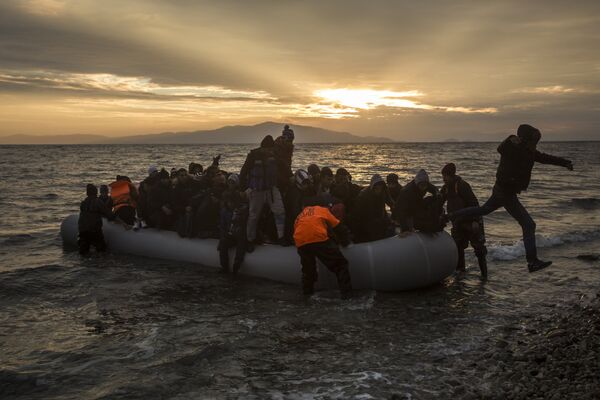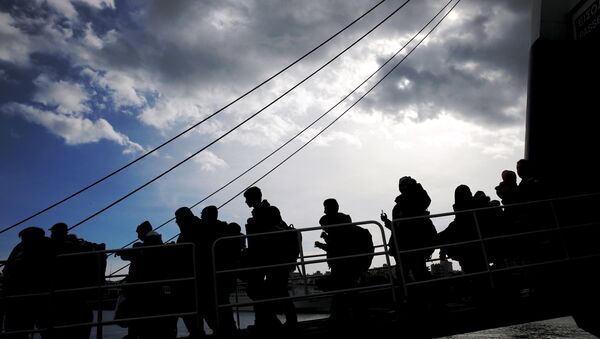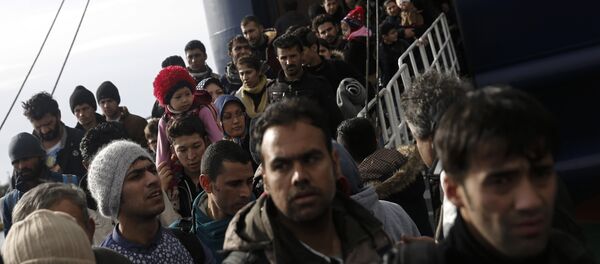The meeting – the first of its kind under the new Dutch six-month rolling presidency of the European Council – comes amid chaos in Europe caused by the refugee and migrant crises, which have led to several countries imposing border controls in contravention of the spirit of borderless Europe.
Tackling #migration & the #refugeecrisis was one of the main issues facing the EU in 2015: https://t.co/em4b8O3v35. https://t.co/U4vK8Xf4VQ
— EU Council (@EUCouncil) January 22, 2016
The Schengen area is a central pillar of the European Union, allowing for the establishment of a borderless Europe, where 26 countries have abolished passport and other border controls.
However, the outer ring of the Schengen zone has been found wanting, with hundreds of thousands of people crossing into Schengen unchecked.
The sheer volume of refugees crossing into Turkey and following the so-called West Balkans route has put intense pressure on many countries in Europe, leading to some– including Croatia, Hungary, Germany, Austria, Denmark and Italy – re-establishing border controls.
Donald Tusk, President of the European Parliament said, in his latest report on the refugee crisis:
"All leaders acknowledge that protecting Schengen requires difficult decisions. In this context, we agreed to rapidly examine the European Commission's proposal to strengthen the EU's external borders, including the idea of the European Border Guard. This is a priority for the Dutch Presidency and we should have political agreement in the Council by June."
The ministers are urgently seeking ways of bolstering the outer Schengen external borders by boosting the Frontex EU border protection force. The diaspora of over a million people fleeing war-torn countries, such as Syria, Iraq and Afghanistan, has precipitated the crisis and exposed the lack of control of Schengen’s outer borders.
"No More Than Two Months"
Greece and Italy bore the brunt of the initial mass movement of people and have become overwhelmed by the sheer volume of refugees arriving in both nations. There had been criticism over the 'hotspots' due to be set up in both Italy and Greece, for specialist teams to process the refugees.
Number of migrants coming to Italy up 50% to 9 700 in December. Total in 2015: 157 000 https://t.co/o0L3USfvLr pic.twitter.com/Vwj7FtCX4R
— Frontex (@Frontex) January 22, 2016
However, in the hotspots of Italy – Lampedusa, Pozzallo, Porte Empedocle, Augusta, Taranto and Trapan – there were only 40 experts dealing with 2,250 refugees.
In Greece, with hotspots in Lesvos, Chios, Samos, Leros and Kos – there were 448 members of Frontex and other staff, dealing with 1,840 refugees.

However, in two of its hotspots – Leros and Kos – it listed there being no reception capacity, yet there were 87 staff, including "Screening and debriefing teams, Border Surveillance, Officer and Advance Level Document Officers".
The Greek Deputy European Affairs Minister Nikos Xidakis has criticized the Austrian interior minister for proposing Greece's "temporary exclusion" from the Schengen passport-free travel zone.
Greece in December agreed to accept a Rapid Border Intervention Team from Frontex.
56% of migrants coming to Greece in 2015 were from Syria. See our updated routes map https://t.co/UCde8h1fyc pic.twitter.com/R2s3Y5L38S
— Frontex (@Frontex) January 25, 2016
The urgency of the meeting Monday was made plain by Tusk in his assessment of Schengen:
"We have no more than two months to get things under control. The statistics over the Christmas period are not encouraging with over 2,000 arrivals to the EU per day, according to Frontex. The March European Council will be the last moment to see if our strategy works. If it doesn't we will face grave consequences such as the collapse of Schengen."



